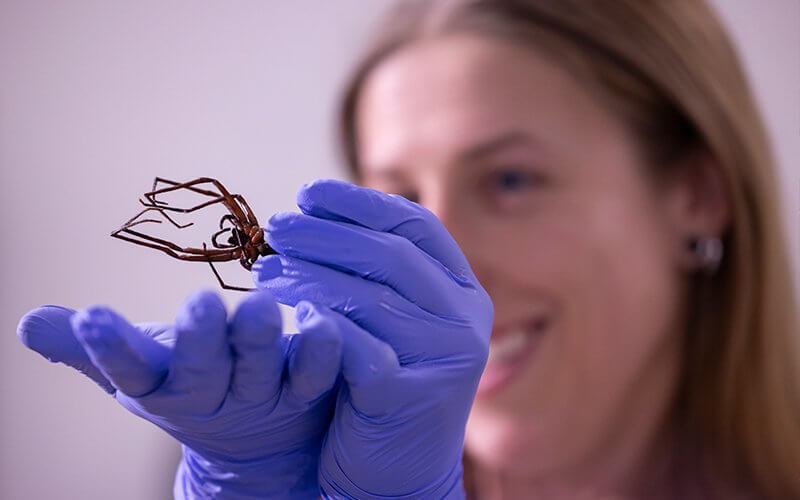
Cal State Fullerton arachnologist Anna Holmquist specializes in the study of arthropods — specifically spiders and insects — and teaches the importance of studying the creepy-crawly creatures. She shares her enthusiasm with her students through lectures, fieldwork and laboratory research. In her Principles of Ecology course, Holmquist uses examples of spiders and other arthropods in every lecture.
“Spiders and insects play integral roles in ecosystems as pollinators, predators, herbivores and more,” said Holmquist, assistant professor of biological science. “We need more understanding about their evolution and ecology, especially in this era of rapid global change.”
Holmquist’s fascination with spiders and other arthropods began at a young age. From their use of webs for prey capture to their sheer diversity, Holmquist said she “was captivated watching their behavior.”
People often associate spiders with Halloween because they’re a scary group of creatures to most people and are more visible during fall. Holmquist said the reason for the surge in the spider population during fall months is because it is mating season, which follows an increased access to insect prey during summer months.
Holmquist says that it is important to dispel the perceived danger of spiders: “A lot of fear is unwarranted, and they’re not as scary as they look.”
“While every family of spiders — except one — uses venom for prey capture, only a handful of spider species are medically significant to humans,” Holmquist said. “This medical significance largely only applies to children, the elderly and those with autoimmune conditions; adults will have mild-moderate symptoms from a bite from species deemed medically significant.”
This fall, Holmquist and her students are researching a Southern California social cobweb spider, called Anelosimus analyticus and their response to the effects of urbanization. The species is in the same family as black widows. The project offers students the opportunity to learn about population genetics and community ecology.
Other student-focused research projects planned include understanding the impact of wildfires on arthropod communities; identifying and documenting spiders from Indonesia; and digitizing the College of Natural Sciences and Mathematics’ entomology collection.